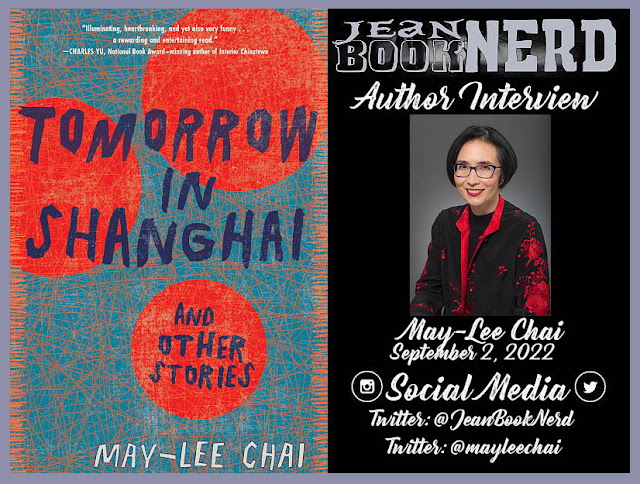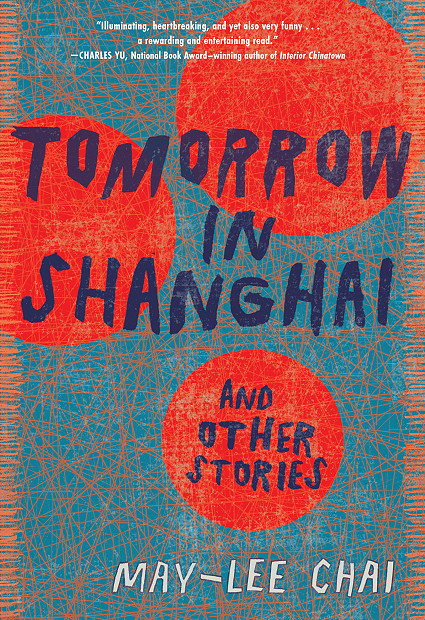Photo Credit: Bob-Hsiang-Photography
May-lee Chai is the author of the American Book Award–winning story collection Useful Phrases for Immigrants and ten other books. Her prize-winning short prose has been published widely, including in the New England Review, Missouri Review, Seventeen, The Rumpus, ZYZZYVA, the Los Angeles Times, Dallas Morning News, and the San Francisco Chronicle. The recipient of an NEA fellowship in prose, Chai is an associate professor in the Creative Writing Department at San Francisco State University.

When/how did you realize you had a creative dream or calling to fulfill?
I found a fast-growing lump in my breast when I was in grad school in an East Asian Studies Master’s program with plans to go onto a Ph.D. When the lump grew from the size of a pea to the size of a walnut over the course of one academic year, I realized I needed to put my health first, or I could actually die before realizing any of my dreams One of those dreams was to write a novel. So I booked an appointment to get the growth removed at the end of the semester, and I applied and was accepted into a creative writing program. I realized life was short and I wanted to pursue the dream of writing creatively, which had seemed impossible and fanciful to me before I decided to take my dream seriously.
What was the single worst distraction that kept you from writing this book?
Nothing, that’s how I managed to complete this book!
Has reading a book ever changed your life? Which one and why, if yes?
Many books have changed my life. For example, Toni Morrison’s The Bluest Eye. Growing up as a brown-eyed Chinese American girl in the U.S., I was used to being told constantly by the media that blue eyes were the only beautiful eye color. The phrase “beautiful blue eyes” was ubiquitous in literature, stories, movies, even silly-seeming celebrity profiles. The fetishization of blue eyes in the U.S. was everywhere, but when I was growing up, I didn’t see anyone addressing this fetishization as a sign of America’s white supremacy or racism, not in my public school and not in the media that I had access to. When I finally found and read The Bluest Eye, I felt such profound relief that someone could express so powerfully in words what was so damaging about this racist fetishization. I felt seen. I felt valued.
Why is storytelling so important for all of us?
If we don’t tell our own stories, we may never see ourselves represented. Or else we may see our communities represented poorly, through the lens of stereotypes or international conflicts or some other gaze that does not do justice to our own complexity.
What was the most surprising thing you learned in creating your characters?
I like writing stories to experiment with form and characters and see where they take me. Each story surprised me in its own way. The majority were written during the Trump administration and/or during the pandemic, which clearly influenced my writing even though the stories do not take place in this era. My characters are struggling against various obstacles, capitalism and economic hardship and/or various kinds of bigotry. As I was putting the collection together, I realized I was exploring characters trying to survive, trying to create a safe home for themselves, looking for acceptance and love and sometimes having to create that place or that family for themselves. Family, love, and home are a struggle for them all.
Writing Behind the Scenes
I spend a lot of time thinking of the names for my characters. As many of the people in my stories are Chinese, I think about what the characters for the names mean in Chinese and how they will be spelled in English, depending on where the character is living and in what time period. For example, one character Lu-ying Chao first appears in the story “Jia” then later appears as an adult in “Slow Train to Beijing” where she introduces herself as Zhao Luying. The difference in spelling reflects the fact she grew up in the U.S. where her family used the Wade Giles system for spelling Chinese Mandarin names into English. This system was common in the U.S. before normalization of relations between the People’s Republic of China and the U.S. In the latter story, she’s living in China, so she gives her name surname first and I use the pinyin spelling (Zhao instead of Chao) to reflect the system used in the PRC.
What is the first job you have had?
Raising chickens. It was not a job that I chose, I was not paid, and it was 7 days a week of really nasty backbreaking work for years, so it was a really, really terrible job. But it’s made every other job after this first one seem better, because thus far nothing else has been as bad!
What is the first thing you think of when you wake up in the morning?
Oh, god, it’s morning already.
If you could be born into history as any famous person who would it be and why?
The Emperor Kang Xi. Why not? He had the longest reign of any Chinese emperor and I can’t even imagine what life with such power is like. Plus the yellow silk robe he’s portrayed wearing in portraits is awesome. That being said, I’d probably be more temperamentally suited to be Emperor Huizong of the Song dynasty because he was known as a patron of the arts and a master calligrapher, a skill I do not possess but would love to have. (Huizong was generally considered by historians to have been somewhat incompetent as an emperor, however. Alas!)
What is one unique thing are you afraid of?
Like almost everyone in GenX who saw the trailer for Jaws as a child, I am afraid of sharks and I was ridiculously terrified of sharks as a child. That’s not unique, I know. But I was afraid of sharks showing up outside of the ocean! Like in the shady part of our doughboy backyard pool when I was a kid, or in large puddles. Sometimes even looking at pictures of the ocean in a magazine would terrify me. I would like to believe this says something about my imaginative powers, but it’s probably more an indication of general anxiety.
In a vibrant and illuminating follow-up to her award-winning story collection, Useful Phrases for Immigrants, May-lee Chai explores a complex blend of cultures spanning China, the Chinese diaspora in America, and in the world at large—revealing the complex schisms in the globalized world. Her stories illuminate the divides between rural and urban, male and female, rich and poor, and those in-between—always tracking the nuanced, knotty, and intricate exchanges of interpersonal and institutional power. Chai's stories are essential reading for an increasingly globalized world.
jbnpastinterviews















0 comments:
Post a Comment